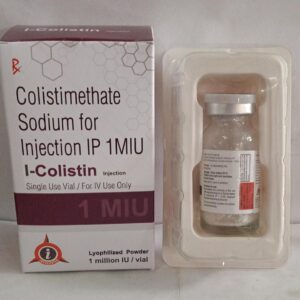Clindamycin Injection 300 mg (Clindawel)
Clindamycin injection is used to treat certain types of bacterial infections, including infections of the lungs, skin, blood, bones, joints, female reproductive organs, and internal organs. Clindamycin is in a class of medications called lincomycin antibiotics. It works by slowing or stopping the growth of bacteria.
What is clindamycin?
Clindamycin is an antibiotics that fights bacteria in the body. Clindamycin is used to treat serious injections caused by bacteria. Clindamycin may also be used for purposes not listed in this medication guide.
Warnings
Clindamycin can cause diarrhea, which may be severe or lead to serious, life-threatening intestinal problems.If you have diarrhea that is watery or bloody, stop using this medicine and call your doctor.
Before using clindamycin, tell your doctor if you have kidney disease, liver disease, an intestinal disorder such as colitis or Crohn’s disease, or a history of asthma, eczema, or allergic skin reaction.
Take clindamycin for the full prescribed length of time. Your symptoms may improve before the infection is completely cleared. Skipping doses may also increase your risk of further infection that is resistant to antibiotics. Clindamycin will not treat a viral infection such as the common cold or flu.
Before taking this medicine
You should not use this medicine if you are allergic to clindamycin or lincomycin.
To make sure clindamycin is safe for you, tell your doctor if you have ever had:
- colitis, Crohn’s disease, or other intestinal disorder;
- eczema, or allergic skin reaction;
- liver disease;
- asthma or a severe allergic reaction to aspirin;
- an allergy to yellow food dye.
Animal studies have not shown any harm during pregnancy, but in humans, it is not known whether clindamycin will harm an unborn baby. Tell your doctor if you are pregnant or plan to become pregnant during treatment.
Clindamycin does pass into breast milk and may cause side effects in the nursing baby. If you are breastfeeding while taking this medicine, call your doctor if your baby has diaper rash, redness or white patches in the mouth or throat, stomach discomfort, or diarrhea that is watery or bloody. Let your doctor know if you are breastfeeding before taking clindamycin.
Clindamycin injection may contain an ingredient that can cause serious side effects or death in very young or premature babies. Do not give this medicine to a child without medical advice.
How should I use clindamycin?
Take clindamycin exactly as prescribed by your doctor. Follow all directions on your prescription label and read all medication guides or instruction sheets. Use the medicine exactly as directed.
Clindamycin injection is taken by mouth. Clindamycin injection is injected into a muscle, or as an infusion into a vein. A healthcare provider will give your first dose and may teach you how to properly use the medication by yourself.
Take the injection with a full glass of water to keep it from irritating your throat.
Measure liquid medicine carefully. Use the dosing syringe provided, or use a medicine dose-measuring device (not a kitchen spoon).
You may need frequent medical tests during treatment.
If you need surgery, let your surgeon know you use clindamycin as it may interact with certain drugs used for anesthesia.
Use this medicine for the full prescribed length of time, even if your symptoms quickly improve. Skipping doses can increase your risk of infection that is resistant to medication. Clindamycin will not treat a viral infection such as the flu or a common cold.
Store at room temperature away from moisture and heat. Protect the injectable medicine from high heat.
What happens if I miss a dose?
Do not use extra medicine to make up the missed dose.
What should I avoid while using clindamycin?
Do not use clindamycin at the same time as the antibiotic, erythromycin.
Clindamycin side effects
Antibiotic medicines can cause diarrhea, which may be a sign of a new infection. Seek medical treatment if you have symptoms of a serious drug reaction that can affect many parts of your body. This reaction may occur several weeks after you began using clindamycin.
Clindamycin can cause diarrhea, which may be severe or lead to serious, life-threatening intestinal problems. If you have diarrhea that is watery or bloody, stop using clindamycin and call your doctor.
- any change in bowel habits;
- severe stomach pain, diarrhea that is watery or bloody;
- little or no urination; or
- a metallic taste in your mouth (after clindamycin injection).
Click on the “Enquire” button to submit your requirement for Pcd pharma franchise or pharma third party manufacturing of this product.
Also For Higher Anitibiotics (Beta-lactam):- WelcureRemedies
Explore more from this category:- Multivitamin , Multimineral Tablet (Intevit-F) Vancomycin 1 gm Injection (I Vanc 1gm) Ondansetron Injection (Insetron)
Tramadol Injection (Integrol)
Terlipersin Injection (Interli-10)
Ascorbic Acid Injection (Welvit -C)
Vitamin A D3 E Biotin (Welrov-H)





Reviews
There are no reviews yet.